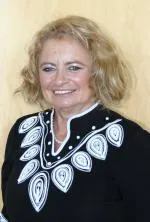Galina Khitrova, University of Arizona Professor of Optical Sciences, Passes Away at Age 57

A fearless and intrepid experimentalist, constantly breaking new ground and attracting exciting partnerships.
Professor of Optical Sciences Galina Khitrova passed away Saturday, June 4, 2016 at her home in Tucson, Ariz. due to complications from chronic health problems. Galina came to the Optical Sciences Center in 1986 to work as an assistant research scientist after earning her Ph.D. in Physics from New York University. She was born in 1959 in St. Petersburg, Russia, and received her undergraduate degrees in Physics from Yerevan State University in Armenia, USSR, and City University of New York, Brooklyn College.
Galina is internationally known for her profound contributions to the fields of semiconductor optics, nonlinear optics of quantum wells and dots, and cavity quantum electrodynamics. Exemplary work includes her 2004 paper on "Vacuum Rabi splitting with a single quantum dot in a photonic crystal nanocavity," published in Nature with colleagues at Caltech and the University of Texas at Austin, which has garnered 1,259 citations.
At the College of Optical Sciences, Galina worked very closely with Professor Hyatt Gibbs, to whom she was later married in 1991, and she became an associate professor with tenure in 1997 and a professor of optical sciences in 2002. Together, Hyatt and Galina nurtured a powerful and unique research group including graduate students, post-docs, and visiting scientists, and unique research capabilities based on molecular beam epitaxy to grow very high-purity, high-quality semiconductor quantum wells, multi-quantum-wells, and quantum dots. They also developed a set of laser spectroscopic tools to precisely characterize the remarkable performance of the nanostructures they generated. They collaborated extensively not only with colleagues at OSC, but also top researchers around the world including Axel Scherer at Caltech and Martin Wegener at Karlsruhe Institute of Technology in Germany.
Galina was proud to characterize her work as "curiosity driven looking for surprises, or using the language of Charlie Towns, 'turning stones'."
"Galina was a fearless and intrepid experimentalist, constantly breaking new ground and attracting exciting partnerships," said Thomas L. Koch, dean of the College of Optical Sciences. "Her propensity to pursue very difficult, high risk topics was really admirable."
Galina was also very active in the scientific community, serving on public policy committees and prize committees for OSA, chairing conferences and serving on conference committees, international advisory boards, and federal agency review panels. She also embraced the idea that great science was not just about laboratories and experiments, but also about remarkable people.
"Galina loved her students and treated them as though they were part of her close family," noted James C. Wyant, professor emeritus of optical sciences and founding dean of the College of Optical Sciences. "She provided them the opportunity to do research at some of the best research labs in Europe, Asia and the United States. She challenged them to present their research at international meetings, and introduced them to the world's leaders in optics and photonics, including several Nobel Laureates. She was very proud of both her current students and her former students and she often referred to them as her children."
Nicolaas Bloembergen, professor emeritus of optical sciences and winner of the 1981 Nobel Prize, when learning of Galina’s passing, reflected on his vivid memory of a party that Galina and Hyatt hosted at their Tucson home in 2010 with attendees of a scientific meeting to celebrate his 90th birthday.
"Galina had organized a tennis tournament on her private court. I was destined to win the game because I was teamed up with a German champion player," explained Bloembergen. "She adopted me and my wife, Delhi, as substitute parents. I also recall the summer of 2015 when Galina took us up to her retreat in Summerhaven at the top of Mount Lemmon. We enjoyed the environment of this small but artistic retreat in the mountains, including the flow of Russian delicacies for lunch and dinner. She drove us back home before dark."
"I, like many of her colleagues, will remember her as an accomplished scientist and personal friend," said Bloembergen.
Hyatt and Galina loved to travel the world and see new places. These travels took them and their friends to South America, Europe, the Middle East, Africa, Antarctica and many other exotic places. Hyatt passed away in 2012 from complications due to mesothelioma.
"Galina and Hyatt were a unique pair, feeding upon each other’s energy," noted Jack Jewell, friend of Galina’s and former student of Hyatt Gibbs. "I believe Galina died of a broken heart, after losing her irreplaceable Hyatt. A love story beyond scriptwriting skills."
Galina was a shining light, a leader in her field, and a dear friend and colleague to many around the globe. The College of Optical Sciences extends condolences to her family and to all those close to Galina; we will all miss her greatly.
The University of Arizona College of Optical Sciences, founded as the Optical Sciences Center, has been shaping the future since 1964 by offering high-quality instruction, cutting-edge research and a solid commitment to the development of the optics industry. OSC remains dedicated to providing the state of Arizona and the nation with an internationally pre-eminent program in all aspects of the study of light. For more information, please visit www.optics.arizona.edu or call 520-621-6997.
Graeme Hunt
Media Content Manager
520-626-4887
ghunt@optics.arizona.edu
